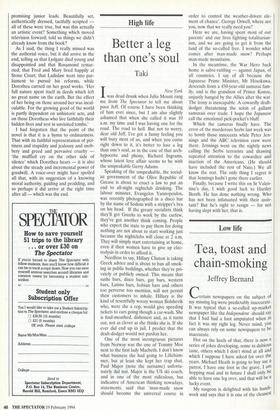Television
A hymn to ordinariness
Martyn Harris
Iwas going to say the only thing I missed in Middlemarch (BBC2, Wednesday, 9.30 p.m.) was the authorial voice: something to give it a bit more intellectual density and raise it above the level of the very good soap opera it mostly was. There is a terror of the voice-over among television and film makers, who see it as betrayal of their art. `Pictures, pictures, pictures,' is the cry of the script editor, slashing out pages of dia- logue, `You must tell the story in pictures.' But even Martin Scorsese, arch-priest of visual eloquence, yields to the narrative voice in The Age of Innocence, where Edith Wharton's words are allowed to infiltrate at key moments, lending distance and irony and depth that you can never quite obtain from the immediacy of film.
Middlemarch was all about ordinary things. There was the erosion of idealism as Lydgate yielded up his ambitions to an empty marriage, and Dorothea her utopian zeal to neighbourly do-gooding. There was the power of the dead over the living in absurd wills and legacies. There was the timeless persistence of people in choosing quite the wrong partner: Dorothea with the dried-up Casaubon, Lydgate with the silly, snobbish Rosamond; the solidly decent Sir James Chettam with empty-headed Celia. And with misalliance went misapprehen- sion, as each character failed to understand the simplest thing about every other, or to pass on the most obvious pieces of infor- mation. Why doesn't Ladislaw tell Dorothea he loves her? Why on earth can't Lydgate use Raffles to force Bulstrode to give him the loan he needs? It was all so obvious to we the audience, flattered into omniscience, and calling out from our stalls, 'Look behind you!'
We were involved; we talked in the pub about bankers like Bulstrode; we argued over dinner whether Dorothea was really fanciable or just a frigid prig — all of which happens less and less with television nowa- days. The BBC has been getting seven mil- lion viewers a week, which is a good return on this bold £6 million step back into the ring. But was it really any more than good costume drama of the kind we used to see every Sunday afternoon? Fine ensemble acting by established character players and promising junior leads. Beautifully set, authentically dressed, tactfully scripted all of these were true, but was this actually an artistic event? Something which moved television forward; told us things we didn't already know from the book?
As I said, the thing I really missed was the authorial voice, but it did arrive in the end, telling us that Lydgate died young and disappointed and that Rosamond remar- ried; that Fred and Mary lived happily at Stone Court; that Ladislaw went into par- liament to pursue his reforms, while Dorothea carried on her good works. 'Her full nature spent itself in deeds which left no great name on the earth. But the effect of her being on those around her was incal- culable. For the growing good of the world is partly dependent on unhistoric acts, and on those Dorotheas who live faithfully their hidden lives and rest in unvisited tombs.'
I had forgotten that the point of the novel is that it is a hymn to ordinariness. That with its faithful representation of pet- tiness and stupidity and jealousy and snob- bery and greed and pervasive cruelty 'the muffled cry on the other side of silence' which Dorothea hears — it is also about the steady and incremental power of goodwill. A voice-over might have spoiled all that, with its suggestion of a knowing moral authority, guiding and prodding, and so perhaps it did arrive at the right time after all — which was the end.



















































 Previous page
Previous page